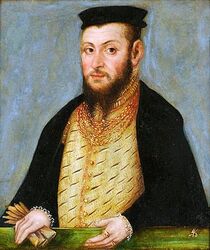
|
This Merveilles des Morte page is under review.
It is currently in progress or has elements that have not been ratified as an official part of the timeline. Additionally it may have outdated information, or may not currently be up to a standard representative of the timeline. You are welcome to correct errors and/or comment at the talk page. |
| Sigismund II August | |
|---|---|
| King of Poland
Grand Duke of Lithuania | |

| |
| Reign | 1560- |
| Born | 1 August 1540 |
| Signature | |
| Religion | Roman Catholicism |
Sigismund II August (1540-) was a king of Poland(1560-) and a Grand Duke of Lithuania (1560-). He was the ruler of Polish Lithuania Commonwealth during the Eight Year's War.
Considered an enigmatic and curious figure by historians, Sigismund was a member of the dynasty that had previously ruled Poland, and was as tradition dictated elected, as a young man, to serve and to rule as the King of Poland. At the beginning of his reign, he knew little of the outside world. Hearing of the activities of various Holy Roman Emperors, he decided the prospect of being elected Holy Roman Emperor was appealing, in order to gain standing and respect in the Empire he requested to join it: however, the Emperor at the time rebuffed these attempts, not wishing Poland to become part of the Empire or considering the integration implausible and potentially difficult. Undeterred by this, Sigismund stood numerous times over the course of several elections. He occasionally gained the secondary or tertiary votes of some electors, and in one election, the Elector of Hesse (who at the time possessed two votes) at his insistence cast a primary vote in his favour. Later in his reign, Poland suffered a series of defeats in minor conflicts, and Sigismund became aware of tensions between his nation and the Tsardom of Russia and its allies. Growing paranoid,he began to believe thatmany of his country's neighbours, were conspiring against him (including Russia, Georgia, Hungary, Hansa, Greece, Moldavia, Cossack and Circassia). Following his death, his two sons struggled for power and a war broke out with Moldavia.
| |||||||||||||||||||||||

